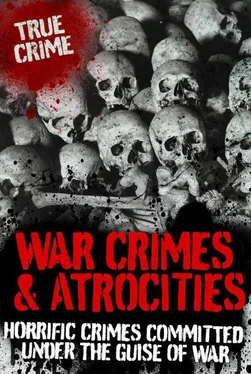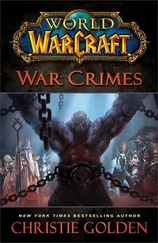Two unarmed UN military observers were found dead about 65 km (40 miles) outside of the village. They had been mercilessly murdered and one had been disembowelled. The women, natives of Jordan and Malawi, were not even involved in the conflict – they had simply been sent there to gather information about the armed groups operating in Ituri.
Days after the massacre, the main Hema militia, the Union of Congolese Patriots (UPC) took control of Bunia. Their reputation was little better than the Lendu’s, as their fighters are estimated to have massacred as many as 10,000 Lendus. Child fighters of the UPC went through Bunia, looting what they could from the remaining houses and off the corpses, showing no respect whatsoever.
In July 2005, 39 civilians were murdered in the village of Ntulumamba, a village in the south Kivu region of the Congo. The victims, mainly women and children, were locked inside their huts, which were then burnt to the ground. The rebels responsible were believed to be from Rwanda, who fled to the Congo when they were accused of taking part in the genocide that left some 800,000 Tutsis and moderate Hutus dead.
There is also considerable evidence that there were many atrocities committed against women during the Congo War. Women have been reportedly tortured, genitally maimed, raped and killed – at times disembowelled to kill a foetus along with its mother. These are the type of atrocities that have taken place out of sight of UN peacekeepers. Mass rapes were often carried out to try and demoralize their enemies, and there are reports of women being buried alive after ramming sticks into their vaginas. In addition to the mental and physical injury suffered by women, there is also the risk of pregnancy and they are particularly vulnerable to contracting HIV because their bodies are open to infection. Women have also been abused in jails and forced into sexual slavery, including a number who have been victims of intimidation.
CANNIBALISM
Cannibalism has been added to the long list of atrocities that have allegedly been carried out by the tribal groups fighting in the Congo. Some of the bodies found at Bunia and other villages had been decapitated, others had their hearts, livers and lungs missing. It has been reported by witnesses that the rebels literally ripped out their victims’ hearts and ate them while they were still warm. Militiamen have allegedly grilled their victims’ bodies on spits over a fire, and two young girls were boiled alive while their mother watched on. Vital organs were said to have been cut off and used as magic charms to ward off evil spirits. In 2003, Zainabo Alfani told UN investigators that she had been forced to watch rebels kill and eat two of her children. She also said that in one corner of the camp she saw cooked flesh from bodies and another two bodies being grilled on a barbecue.
THE CURRENT SITUATION
Despite the fact that the UN peacekeeping mission has stepped up its efforts to combat armed rebel groups in the Congo, the insecurity and violence continue to torment the African civilians. Today it is estimated that there are still as many as 38,000 Congolese civilians dying each month, that is about 1,250 each day, either as a direct result of violence or preventable diseases and malnutrition.
For the first time in 40 years, 18 million Congolese went to the polls on 30 July, 2006. They voted for a new president and national assembly and, in general, the voting was a peaceful and well organized affair.
Congo’s president, Joseph Kabila, was declared the winner of the elections by the Independent Electoral Commission of the Democratic Republic of Congo on 15 November, 2006, and following the results he called for calm. The final outcome was the culmination of a four-year transition process which was designed at bringing democracy to the troubled African nation after decades of dictatorship and war. However, Kabila’s rival, Jean-Pierre Bemba, released a statement saying that he was not prepared to accept the election result and his supporters disputed that the figures released were inaccurate. Election officials have rejected any claims of fraud and state the the polling was, in general, fair. The UN peacekeeping force stepped up its security for fear of renewed fighting, and it appears that the election results will do nothing to bring peace to the long-suffering people of the Congo.
CONGO REBEL CHARGED WITH WAR CRIMES
Thomas Lubanga, leader of the Union of Congolese Patriots (UPC) militia group, is the first person to be charged of war crimes at the International Criminal Court (ICC) in The Hague. The charges against him include recruitment of child soldiers, murder, torture and rape. The ICC was set up in 2002 to deal with war crimes and genocide worldwide. Lubanga was arrested in 2005 after nine Bangladeshi UN peacekeepers were killed in the volatile Ituri district. He is thought to be one of the most notorious warlords of the 21st century and, soldiers under his command, are accused not just of murder, torture and rape, but also of mutilation.
Although the ICC has also issued arrest warrants for leaders of Uganda’s rebel Lord’s Resistance Army, they are currently being given amnesty by the Ugandan government and so no action can be taken.
1999–present

Disturbing evidence has been gathered in Chechnya that proves that Russian and Chechen forces have committed major abuses, including war crimes, in their second campaign on an already war-torn republic. Since 2001 mass ‘dumping sites’ for human remains have been uncovered, adding to the already long list of human rights violations committed by the warring sides of the ongoing war. These violations include forced disappearances, mass hostage takings, rapes, massacres and mass killings.
Graffiti found on a wall in the city of Grozny, spells out what the citizens of Chechnya have been living through:
Welcome to Hell: Part Two!
These words sum up the atrocities that have taken place in Russia’s supposed fight against terrorism, but it is the Chechen civilians who have borne the brunt of the Russian offensive in this war. Although both Russian and Chechen sides have been accused of resorting to unfair harsh methods during the conflict, it has, for a long time, been cleverly shielded from the eyes of the UN Commission on Human Rights.
CHECHNYA’S IMPORTANCE TO RUSSIA
Chechnya is not a separate country but a republic situated on the northern slopes of the Caucasus Mountains. It is strategically important to the Russian Federation for two reasons: its access routes to both the Black Sea and the Caspian Sea go through Chechnya, and vital oil and gas pipelines also run through Chechnya, connecting it with Kazakstan and Azerbaijan. With the dissolution of the Soviet Union in 1991, Chechnya declared its independence from Russia, which, as a result of ongoing differences, ultimately led to a civil war in 1993. Ethnic groups began stirring up trouble in their fight for more autonomy, and one of the more volatile groups were the Chechens. The Chechens had a long and bloody history of opposition to being governed by Moscow. By 1994, the relationship between the breakaway government in Chechnya and the Russian government had seriously deteriorated.
The First Chechen War started in 1994 when Russian forces entered Chechnya to try and restore constitutional order. What turned out to be a rather embarrassing and bloody conflict, ended in August 1996, with the Chechens claiming victory and independence, and the Russians also claiming victory and the retention of Chechnya as part of Russia. Clashes continued for a while until the 1996 Khasavyurt ceasefire agreement, causing the Russians to finally withdraw from Chechnya.
Читать дальше













